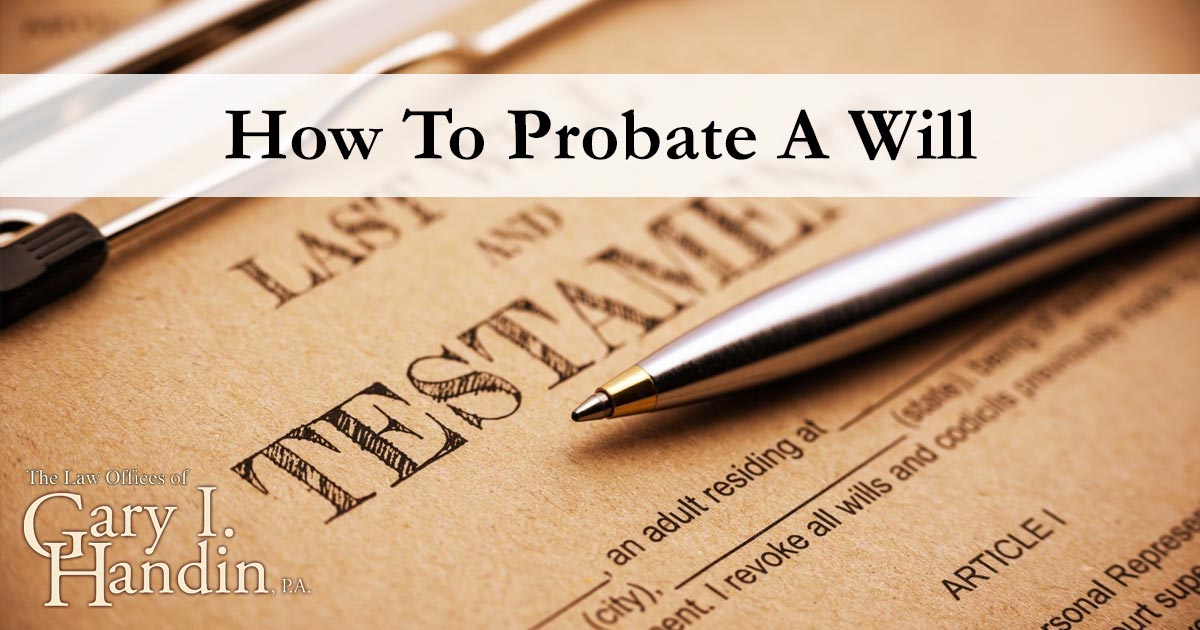
Probate is a legal process by which the assets of a deceased person’s estate are distributed to heirs per the instructions contained in their will. Unfortunately, to probate a will is a lengthy and complex process which can take many months and which can be quite expensive, depending on the nature of the issues which arise during the probate process. The more you understand about the probate process, the better you’ll be able to comply with the legal requirements, and the sooner you’ll be able to ensure that the assets of your loved one’s estate are distributed according to their wishes.
Identify the Personal Representative of the Estate
Once you’ve accessed the original will, you should be able to identify the personal representative of the estate (this is usually listed in the will). The personal representative of the estate will need to file for probate proceedings in the appropriate court – this will usually be the Circuit Court in the county in which the deceased was a resident. If you are the personal representative of the estate, it is advisable that you seek the advice of a probate lawyer to guide you through the process. In fact, according to the Florida Probate Rules, a Personal Representative is required to have a probate attorney, unless they are the sole beneficiary of the estate. Before the Personal Representative files the petition, they need to be officially authorized by the court to settle the deceased’s estate. This means that the Personal Representative as nominated in the will must apply to be officially appointed by the court. Once the court has issued the Letters of Administration, the Personal Representative may proceed to probate the will.
File the Probate Petition
Determining which court is the appropriate court to file the probate petition is important, as this will in turn determine which County Clerk’s office will be processing the Petition. Once the relevant documents have been completed, the Personal Representative will need to file the petition so that a date for the probate hearing can be set on the court’s docket. All beneficiaries must be given notice of the petition hearing so that they can contest the will if they choose to do so – although hopefully this won’t be necessary.
Taking an Inventory of Assets and Giving Notice to Creditors
The next important step to follow is for the Personal Representative to take an inventory of all the assets – both physical and non-physical – which need to go through probate proceedings. Certain assets may be able to avoid probate – for example, bank or brokerage accounts which have Transfer on Death (TOD) designations, and certain retirement funds which provide for direct transfer to beneficiaries on death. The Personal Representative is also required to give notice to creditors that the will is being probated – in terms of the Florida Probate Rules, creditors must be given 90 days’ notice to file their claims against the deceased estate.
Proving the Will is Valid
When you probate a will, you will need to prove to the court that the will is valid before it can be administered. In Florida, some wills are ‘self-proving’, which means that this part of the process can be skipped. A will is self-proving if the witnesses signed a statement in front of a notary public when they watched the testator sign the will. If the will is not self-proving, additional evidence may need to be submitted to court, including witness statements attesting to the will’s validity.
Distribution of Assets
Once the will has been proven to be valid, the Personal Representative has received letters of administration from the Court and claims from creditors received, the Personal Representative can begin to plan to distribute the assets of the estate, under the court’s supervision. Creditors and taxes will need to be paid, and reimbursements related to funeral expenses will also likely need to be made. Whatever is left of the estate will need to be distributed to heirs. The Personal Representative will submit a detailed account to the court explaining what assets and liabilities attached to the deceased estate, and how the Personal Representative plans to manage and distribute these assets. If nobody contests the account, and the court is satisfied with the distribution, the Personal Representative will be given the go-ahead and will begin to transfer assets out of the deceased estate. When all the assets have been distributed, the Personal Representative will ask the court to close the estate and the process will be concluded.
Find a Probate Lawyer You Can Trust
As the above makes clear, probating a will is no easy task, and it usually requires detailed legal knowledge, time, and money. If you have been nominated as a Personal Representative of your loved one’s estate, you want to be sure that you have the best probate attorney on your side to guide you through the process and make things as simple as possible. Contact the offices of Gary Handin, PA., today to find out how we can help you probate your loved one’s will.






